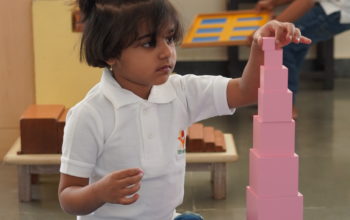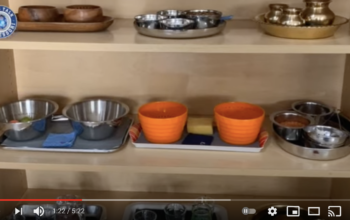This episode presents the non-conscious powers: Absorbent Mind, Horme and Mneme in the Spiritual Embryo. While the Absorbent Mind absorbs the elements from the environment, the Mneme incarnates whatever absorbent mind has absorbed. Horme drives the child to accomplish the tasks. The child will not retain these powers forever. Once the conscious powers like Intelligence, Willpower and conscious memory are developed, the non-conscious powers, Horme, Mneme and Absorbent Mind, gradually decrease and fade away.
Episode – 6 The Spiritual Embryo
This episode discusses how the child is born incomplete compared to the animal babies. At birth, the child has eyes but no sight, ears but no listening, hands but no grasp, legs without coordination. In short, the child is almost a mass of flesh. During the first days of life the spirit is blown into this mass of flesh. Nature has provided the child with the powers to create his future being.
Freedom and Discipline
The First thing we notice in a Montessori class is discipline. 30 – 35 children in the Montessori classroom, moving busily minding their own work without the teacher’s instruction.
Episode 5 – Developmental Stages
This episode is about the developmental stages of the human being. It discusses the difference in growth and development and the reasons for classifying developmental stages in the blocks of 6 years.
Episode 4 – Metamorphosis
This episode explores the idea of metamorphosis in children. Ordinarily, metamorphosis is associated with Insects and frogs, which go through striking transformations in their life cycle. Contrary to the popular belief that development is constantly upward, the child’s development has ups and downs, births and rebirths, and metamorphosis in mental and physical aspects! This is exactly how the child develops.
Episode 3 – Natural Laws of Development
All living and non-living things in this world are influenced by some power. Human beings are not exempt from this. The child also develops according to the rules laid by that power which Maria Montessori calls Natural Laws of Development. Understanding these laws helps us to support the child better. This episode provides a brief introduction to the Laws of Development.
Episode 2 – Freedom and Discipline
Freedom and discipline are essential in a child’s development. We can observe both these in the Montessori Houses of Children. How does discipline prevail… freedom works with discipline. Know the kinds of freedom and their limitations in the Montessori environment.
Episode 1 – Montessori House of Children
In this episode, Dr S Rekha Reddy shares her experience visiting the Montessori school for the first time. A Montessori school is called ‘House of Children’ since it’s a place specifically created for the children. It is categorically different from regular schools as it has been constructed keeping in mind the specific needs of the children. It is quite an enigma to see the children work independently within the confines of discipline when they are seemingly contradictory. What is typical of a Montessori environment is the premise of this episode.
Introduction – Maguvininda Manava Montessori Kannada Podcast
Maguvininda Manava is a Kannada podcast about the Montessori Method of education. It is beneficial to all parents irrespective of whether their children are in Montessori school or not. It is advantageous for teachers, principals and anyone interested in the Montessori m
Four Rules to Display Montessori Materials
The Montessori schools are sending low-cost Montessori materials to keep learning momentum and facilitate active learning at home. Many parents do not know how to arrange them and wonder whether to stack or organise them. If organised, on what basis? There are four rules for displaying the materials as attractive, inviting, and stimulating for the children.


